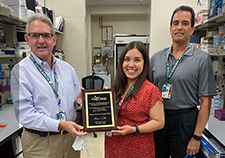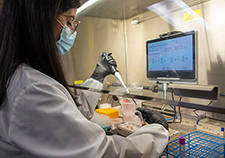Office of Research & Development |
 |


© Getty Images/gorodenkoff
July 12, 2023
By Tristan HorromVA's research enterprise saved lives. We repeatedly and steadily improved clinical practices, found new and better ways to fight COVID-19, and we will continue to do so into the future.
When COVID-19 was declared a public health emergency in January 2020, VA’s Office of Research and Development (ORD) immediately put its considerable resources to work, rapidly mobilizing capabilities to scientifically understand the SARS-CoV-2 virus and providing operational support to help protect Veterans. Even now, with President Biden having announced the end of the pandemic on May 11, 2023, VA researchers across the nation continue to examine both the virus itself and how the VA’s own facilities managed the pandemic to ensure both this nation’s learning health care system and its overall readiness to deal with a crisis were improved by the challenges of the last three years.
Throughout the pandemic, ORD’s researchers and staff demonstrated why and how they are a key part of the largest integrated health care system in the country by partnering with several federal organizations at various levels, including the Department of Defense, National Institutes of Health, Food and Drug Administration, Office of Science and Technology Policy, Biomedical Advanced Research and Development Authority, and Centers for Disease Control and Prevention.

VA center training the next generation of researchers in blood clots and inflammation

AI to Maximize Treatment for Veterans with Head and Neck Cancer

VA researcher works to improve antibiotic prescribing for Veterans

VA’s Million Veteran Program played crucial role in nation’s response to COVID-19 pandemic
Not only did ORD collaborate in large initiatives involving federal, academic, and industry partners—such as Accelerating COVID-19 Therapeutic Interventions and Vaccines (ACTIV)—but it also conducted more than 700 research projects, resulting in more than 2,000 research publications released by VA authors. Furthermore, it established new enterprise capabilities that enable VA to advance research in infectious diseases more broadly through its clinical trials, data science, and biorepository networks.
“VA’s research enterprise saved lives,” said Dr. Rachel Ramoni, VA’s chief research and development officer. “We repeatedly and steadily improved clinical practices, found new and better ways to fight COVID-19, and we will continue to do so into the future.”
Researchers from more than 80 different VA medical centers across the country have been involved in COVID-19 studies. Through large multi-site trials such as the VA Coronavirus Research & Efficacy Studies (VA CURES) and Strategies and Treatments for Respiratory and Infections and Viral Emergencies (STRIVE), VA researchers led the nation in evaluating treatments and prevention strategies to address the health crisis.
VA investigators also led the way in a wide variety of COVID-19 research areas, from evaluating nasal swab virus tests and 3-D printed mask performance to natural history studies that explained the biological structure of the virus. When SARS-CoV-2 emerged as a deadly new virus, ORD scientists went back to the beginning for new studies on how the virus affected the body and the best ways to deal with it. In particular, the VA St. Louis Health Care System led by Dr. Ziyad Al-Aly made groundbreaking discoveries on long COVID ― a term for when COVID-19 symptoms linger for months or years—revealing that the virus can affect nearly every system in the body and potentially damage the heart, kidneys, and other organs.
VA’s research on COVID-19 will also have longstanding impacts beyond treating the aftereffects of the disease. During the pandemic, Dr. Theodore Iwashyna of the Ann Arbor VA discovered a systematic error in pulse oxygen measurements in Black patients. A pulse oximeter measures the amount of oxygen in the blood by shining a light beam through the skin, and Dr. Iwashyna’s work showed that this device can give false readings for people with more skin pigmentation. This finding led to an FDA investigation into the devices, and VA is working with manufacturers for find solutions. Accurate blood oxygen readings are essential not just for COVID-19 patients, but for patients with multiple other health conditions as well.
Furthermore, VA’s researchers and staff helped support local and national Fourth Mission goals of preparing the nation’s response to a crisis ― many even served care needs through various jobs that were not necessarily research-related. The same coordination, support, and skill sets that are crucial to conducting research became particularly useful in many other areas of need. For example, through the Cooperative Studies Program Pharmacy Coordinating Center, vaccines were stored and distributed to Native American populations in New Mexico when called upon by local authorities and the Indian Health Service.
Many of these research accomplishments were made possible thanks to the altruism of Veterans who once again served their country by volunteering for research trials. Additionally, more than 220,000 volunteers completed the Million Veteran Program COVID-19 survey to help researchers learn more about Veterans’ experiences with COVID-19, including its impacts on physical and mental health. Over 58,000 Veterans also volunteered for the national COVID research registry, allowing researchers to contact them for inclusion in studies.
“It is thanks to our investigators, staff, operational partners, and Veteran volunteers that we’ve seen an end to the pandemic,” said Ramoni. “ORD proved the power of our scientifically motivated, team-based approach, and I’m so proud of each of you and your tremendous accomplishments.”
While COVID-19 continues to be a concern for the United States and the world, there is no doubt the public health emergency could not have ended without the countless hours of effort from VA’s dedicated researcher investigators.
VA Research Currents archives || Sign up for VA Research updates